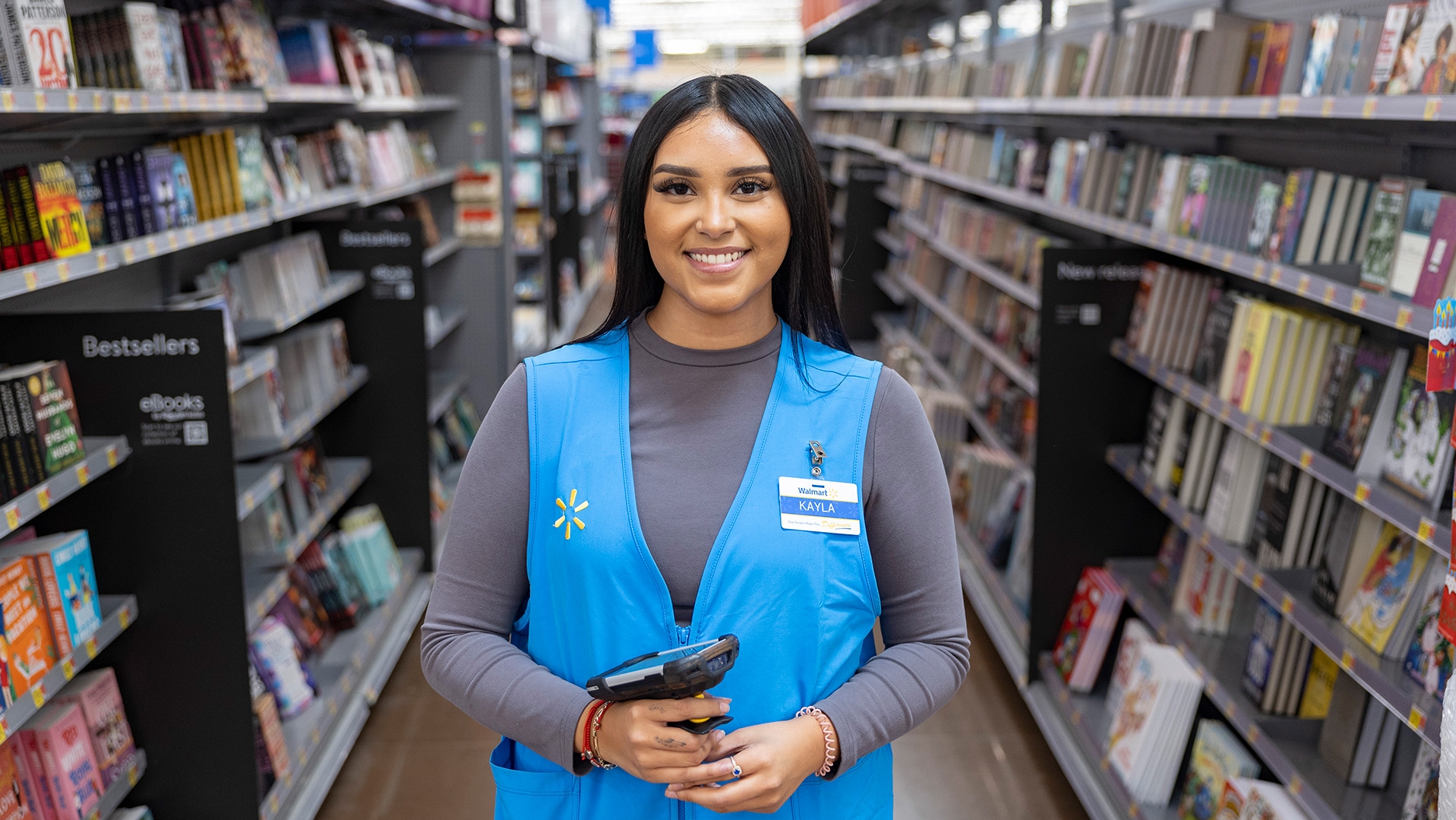In this podcast, Motley Fool host Mary Long catches up with Jason Del Rey, author of Winner Sells All: Amazon, Walmart, and the Battle for Our Wallets. They talk about:
- How Amazon often beat Walmart's low-price guarantee.
- How incentives slowed down Walmart's e-commerce rollout.
- Why Walmart was hesitant about creating a loyalty program.
- Amazon and Walmart's push into healthcare.
To catch full episodes of all The Motley Fool's free podcasts, check out our podcast center. To get started investing, check out our quick-start guide to investing in stocks. A full transcript follows the video.
This video was recorded on June 25, 2023.
Jason Del Rey: While Walmart's leadership today, like Doug McMillon would say, it's very important to keep Sam's legacy alive, I think there was to a lot of people just in a sense that Walmart still in this era, now, was worrying about Sam's methods and strategies and tactics too much for a world that Sam never lived in.
Mary Long: I'm Mary Long and Matt's Jason Del Rey, author of the new book, Winner Sells All, Amazon, Walmart and the Battle for Our Wallets. I caught up with Del Rey to talk about why Walmart and Amazon even need to battle for your money, Amazon's foray into grocery and the cultural forces that continue to drive each of these companies. Your book is called Winner Sells All, but is the world really not wide enough for both Amazon and Walmart? Why does this battle have to have a winner?
Jason Del Rey: Listen, I think when I started writing the book three years ago, it really did seem like we were headed in a direction, at least in the online world where Amazon just continued to gobble up market share and in large product categories, might eventually be just about the last entity standing. The marketplace is ever expanding, sellers feel like if they're selling online, they have to do business with Amazon and so for a long time, I think there are people who care about the future of retail that were worried that at least online that's the way we were heading. I think things have changed a bit over the last year or two, but we can get to that.
Mary Long: You hinted at this, but you've spent the past decade recording on these two companies. A lot has changed over that time. What's the overview of that? How has the rivalry between these two titans changed in the past 10 years?
Jason Del Rey: I started covering these companies in 2013 and back then, Walmart, they were pitching me on e-commerce stories. They were saying they were serious but if you just looked at their business the way it was headed, if you talked to folks in their headquarters of Bentonville, it was really not a main priority of theirs. We fast-forward until 2016 when Walmart made the acquisition of Jet.com, a lot of people would say they really spent 3.3 billion just to acquire the founder of Jet.com, Marc Lore. Then you see the metabolism pickup in their digital offerings. Not all successful for sure but you finally could believe if you were paying attention to the company that they were seeing Amazon as a long-term existential threat and trying to do something about it.
Mary Long: There were times when I was reading your book and it almost felt like a business espionage, not like a story.
Jason Del Rey: That's great. [LAUGHTER]
Mary Long: Early on, while Amazon pretty clearly seen as this huge competitor in the e-commerce space and Walmart's struggling to get there, there are all these moments where Amazon is just consistently able to beat Walmart on their low price guarantee. How are they able to do that?
Jason Del Rey: For a long time, Amazon was tracking Walmart prices. They were doing it online and then they were trying to figure out ways to do it in store, old school ways like sending someone in with a clipboard. That person got kicked out pretty quickly from Walmart stores, but in other ways through pricing apps and the like. Walmart at the time, they were more concerned about the pricing between their own stores and their own website than they were Amazon and so I've quotes in the book from former Amazon executive saying, "They just left the digital door wide open for us. We were tracking them, they weren't matching us," and it really came down to a couple of things. One is, I think this book is the classic case study of the innovator's dilemma. I think Walmart, so successful on physical retail, still to this day, but really we're looking at this less profitable or unprofitable channel and trying to create incentives that employees at their companies could live with that both kept the stores profitable but grew the online business. It was just very messy and very disjointed for a very long period of time, which created this just giant gift to Amazon that always worried that if Walmart turned their stores into same-day pickup and same-day delivery centers, Amazon might've been stopped in their tracks many years ago.
Mary Long: Your book makes the argument that corporate culture unlike the legacies of these two really prominent founder CEOs, Sam Walton and Jeff Bezos, they live on throughout the company, even when Jeff Bezos was obviously there while this rivalry is taking place, but even after those CEOs leave. What impacted the personality of these two behemoths play in this battle and in shaping corporate culture?
Jason Del Rey: I'll start on the Walmart side because this was the most surprising. As I started reporting the book out, I talked to a bunch of folks who joined Walmart just in the last four or five years. Many of them told me, "Jason, we walked into meetings and we would hear someone say, what would Sam do?" Of course that's a reference to Sam Walton. Several of them told me, I looked around and I thought it might be a joke, but, no seriously Sam Walton, yes, amazing entrepreneurial founder of this company, Sam Walton died in 1992. Why are we still concerned about what would Sam do yet we should think about his values, but this is a totally different world. I think while Walmart's leadership today, like Doug McMillon, the CEO who I spoke to for the book would say, it's very important to keep Sam's legacy alive, I think there was to a lot of people just in a sense that Walmart still in this era now was worrying about Sam's methods and strategies and tactics too much for a world that Sam never lived in. On the Amazon side, I think Jeff Bezos, as the founder of this company, felt very strongly about a few things. One was in fact consumer obsession, which was a Sam Walton thing too. Two was bias for action. Again, funny enough, not coincident, a Sam Walton thing, and so for all these years, we saw Amazon as the younger company, actually living by these mantras, moving really quickly, organizing their company into small teams, these two pizza teams to move quickly. While Walmart was getting fat and bloated on their own success and thinking that they were keeping Sam's thinking alive but Sam Walton, the entrepreneur, would have not loved the top-down decision-making. I think that those are just some of the ways that we saw over time the founder's DNA affect the companies in both positive and negative ways.
Mary Long: You quote a lot of Amazon executives throughout the book that keep saying, we are waiting around basically for Walmart to leverage their physical network of stores. Amazon expected that to be a deal breaker. But in Walmart's quest to dive into e-commerce, there was actually a lot of tension between the walmart.com and e-commerce team and the department that handled physical stores. Can you speak a little bit about that tension and why it continued to persist?
Jason Del Rey: Sure. It's gone on for a decade or two now, all the way through the Marc Lore era in the way 2010s, and there were a couple of reasons why. Maybe obvious one, is when people have incentives and business, their actions usually follow what's in the best interest of reaching those incentives or hitting those incentives. Physical retail at Walmart, a lot of those leaders, they're judged on profitability. E-commerce folks for a long time [laughs] not judged on profitability, at least under Marc Lore and the Jet.com folks. They were judged on growth. Inherently, there's going to be big issues there. Another thing is, for a long-time, Walmart rightfully was concerned that online would cannibalize in-store sales. That is, absolutely happens, but they finally needed to have leaders who had the long-term view that this is OK in the short-term. We want to keep people in the Walmart ecosystem. If it's a store online, we'll need to figure out the profitability and how we can balance that, but if we're not providing what the customer wants, where they want it, they will go find it somewhere else. Those were two key reasons why cannibalization and incentives. Just in the last four or five years have we seen a shift that makes me think that perhaps Walmart is finally on a path where they recognize, let's take advantage of our advantages and let's figure out how to balance the profitability, but we need to meet customers where they want to be.
Mary Long: Let's talk a little bit about each company's loyalty programs and the way that they operate in their e-commerce segments. What are the origin stories of Prime and Walmart Plus?
Jason Del Rey: Sure. Prime started way back in 2005, really took some years to gain momentum. A big addition was offering video service, even in the early days where that addition of video to Prime really the content was not very good. But Bezos had seen what Netflix did when they switched from DVDs to streaming. If you're not raising the price on someone, are they going to really complain if the content isn't that great initially, or are they going to be thankful for what they see as like added value? Some people would say that Bezos looked at Costco and saw the loyalty they built. That was another factor as well. Then over time, you don't have Prime and speedy delivery without the massive fulfillment center network that Amazon has built. They actually overbuilt it during the pandemic, but nonetheless that allowed for it. On the Walmart side, Walmart Plus is only a couple of years old. They had talked about a membership program for a long time. I have a memo in my book that was passed around and circulated by a strategy team a couple of years before Walmart Plus saw the light of day. They struggled for a long time with the idea that we believe in everyday low price, and if we cordoned off part of our business or part of our attention to people paying more, does that somehow go against the everyday low price philosophies, Sam's philosophy? At the end of the day, they finally made the decision, like we're just getting our butts being in with this Prime thing. Prime customers spend so much more. A lot of Walmart's best customers were becoming Prime customers, and they finally, I believe in 2020, stuck their toes in the water and launched the Walmart Plus with fast delivery of groceries and general merchandise, some discounts at gas stations. Over time, they've added a little more around prescription drugs. They've added some around discounts to entertainment video streaming services. I think they really are trying to make this maybe not an out competitor, but something that becomes a competitive advantage for them.
Mary Long: I think a huge theme of your book is like Walmart is moving along on this path and then Amazon makes an announcement, and Walmart has to play catch-up to meet them there. A great example of this was the 2017 acquisition of Whole Foods. There was a story about Walmart having its own acquisition, and they have plans to make the announcement of this acquisition on the same date that actually Amazon announces this Whole Foods news. Can you share that story with us?
Jason Del Rey: I played a little role in this story. On the Walmart side, they acquired what people in the industry would call a digital native brand. It was a men's wear brand called Bonobos, and that started online and then opened up showrooms too, so you can go try on stuff and then have it delivered straight to your home. In April of that year, I broke a story that Walmart was in advanced talks to buy Bonobos. Yes, they didn't talk to me at the time, but a month or two later on, I believe the date was June 16th, that was a Friday, they announced through an article in the New York Times that they've made this acquisition, and it speaks to a new day at Walmart. In some ways, it did, but that same morning, and I forgot the exact timing, the business world and really just the whole new cycle blows up when Amazon announces the acquisition of Whole Foods for more than $13 billion. I talked to folks at Walmart who were just like, men. I think one of the quotes was like, "It just showed we were playing checkers. They were playing chess." Another executive he was just like, "My heart sank." There were some like Marc Lore himself who said, "Listen, if they had bought Kroger, a real mainstream grocery that competes head-on with us, I would've been like, we're screwed." Instead, I saw there wasn't a ton of overlap, and he instead tried to use the new cycle to create internal urgency, just about expanding faster in the grocery space. But yeah, that was just a gift to journalists who are covering the narrative of Walmart seemingly being one step behind Amazon many times over the course of their histories.
Mary Long: But about the grocery acquisition like you and Marc Lore make a great point. Even today, Walmart still has over 25% of US market share when it comes to grocery and Whole Foods has less than 2%. So huge acquisition and an indicator of Amazon's like grand vision, but why is the grocery industry so coveted in the first place? Like yes, it's a necessity, but you even mentioned in the book, margins are pretty notoriously slim. Why do both companies so badly want a piece of that?
Jason Del Rey: Walmart didn't start in grocery, but obviously ended up adding it in decades ago, and they've done incredibly well on this space. Amazon.
Jason Del Rey: You go back, I think I have a memo in the book from some of their early years. There was an executive named Doug Harrington, who today is actually the CEO of Amazon's entire retail business essentially, their core consumer business. He basically, said, it comes down to ambition, Amazon had ambition that they could be the everything retailer. If you want to be the everything retailer and have customers coming back the most frequently, you need to give them a service that makes it possible to buy the stuff that people buy the most frequently, and that's grocery and CPG consumer packaged goods. It was a long-term vision that if we aspire to be as big and as impactful as these big retailers that were much younger than Walmart chief among them, we need to do something in this space. We see a variety of attempts over the years. Amazon Fresh delivery for many years, different pricing models, different geographies, frankly, different levels of quality of their food over the years. Then, to me, it felt like the whole foods deal felt like a bit of a white flag, that this space is really hard and we need some help. I'll say how many years later are we now, five or six years after that deal, I don't think it's been as successful as they hoped it would be. I think they're obviously trying to figure out through the Amazon fresh grocery store chain, can we be a player in mainstream grocery? If so, what is our differentiation? There's no other way to say it, they've struggled a ton in that space.
Mary Long: There's a lot of talk, especially by Marc Lore in this book about this idea of conversational commerce and ordering something by talking to someone, some assistant. It's different, but reminds me a lot of Amazon's Alexa and Amazon's whole foray into our homes. Why does Amazon and Walmart for that matter, why do they want to get inside of our homes?
Jason Del Rey: Creepy, but they do. I will answer that question, but I just want to share a quick aside and anecdote that reminded me of, you were just talking about the back-and-forth between the companies and I think it's easy for regular people whether consumers or employees to recognize that, some decisions made by very important people controlling very powerful companies are really about ego or insecurity. I've one funny anecdote in the book where Walmart CEO finds out that Amazon's launching this delivery inside-your-home program called Amazon key, at least that's what it was called. Walmart's e-commerce team, hears this and the directive is, we need to spin up some type of pilot test in this space that they were not working on previously before Amazon announces this so we could just beat them and control the narrative. They ended up doing that. Anyway, it was related and I just spoke a lot to the fact that individual people are making really important decisions that impacts so many of us. and they're not always for the best reasons or just business reasons or consumer-centric reasons. To your question about why in the home? I think Amazon thought they failed on the phone, the fire phone way back in the day.
A lot of people just forget about that because Alexa was a blockbuster hit that shocked a lot of people, I think even inside Amazon. I think phase thought that, we may move to a world where the next technology platform, the next computing platform that people interacted with every day would be speaking voice recognition and not computers and so there was this race to control that. I think now on the Walmart side and what you've referenced with Marc Lore, I think he's looking at all the advantages that Amazon has over Walmart. Really struggled to see where Walmart's advantage would be. Maybe not on price, maybe not on convenience, what could it be? He and some people cooked up this idea that it could be personalizing the shopping experience for every individual customer. As you've referenced earlier, you don't have to wait through the bizarre of ridiculous amount of results on Amazon or Walmart's web pages. If you could speak what you want or text what you want, and the technology and the human's collaborators could do it well enough to give you what you want. Maybe long term, there's an advantage that Walmart can harness, we just haven't seen it manifest itself in any meaningful way yet.
Mary Long: There are so many different sectors that both of these companies are already in that they want to be in and I could pick your brain about all of them but I'll just summarize [laughs]. There's chapter in your book called Walmart 2040, so what is the 2040 vision for Walmart but also for Amazon?
Jason Del Rey: The Walmart 2040, that phrase comes from a memo that Marc Lore and a colleague wrote right before Marc Lore left Walmart in, I'm blanking on the year now, all these years but I think either 2022 or 2021.
Mary Long: That's high pandemic when years blend together.
Jason Del Rey: This whole project I worked on throughout the pandemic so [laughs] I feel like many years lost in my life and unfortunately in my families too have a lot of making up to do, to my two kids and my wife, but back to Walmart 2040. Part of that vision was actually just what I weighed out Walmart's going to have a hard time beating Amazon price convenience selection. We're going to have to just get really good at personalizing the experience for each customer and maybe that'll create this disadvantage. A lot of that memo was about this conversational commerce idea. On the Amazon side and Walmart as well though, and I have a whole chapter on this which I was really excited to dig into, was their motivations in healthcare. Really, I think a lot of the books about core retail categories but I think if we look out 10,20 years, there's the potential that the greatest impact these companies have, at least in the US, on the greatest amount of people ends up coming long-term through their healthcare services. I'm talking pharmacies, of course, Walmart has had for years, Amazon now dabbling in, but really physical medical offices. Amazon had a four billion-dollar acquisition in that space. Walmart's expanding their own Walmart health clinics and also virtual care. They are both really serious about getting into this space thinking the incumbents really just have this disregard for consumers. The pricing is pretty awful in this country. They're trying their best to make inroads here. Very unwelcoming industry to newcomers but they've a lot of money to spend and that's the space really long term that I have my eye on because I just think there's going to be a lot of big impacts to come in that space.
Mary Long: As always, people on the program may have interest in the stocks they talk about. The Motley Fool may have formal recommendations for or against, so don't buy or sell stocks based solely on what you hear. I'm Mary Long, thanks for listening. We'll see you tomorrow.





